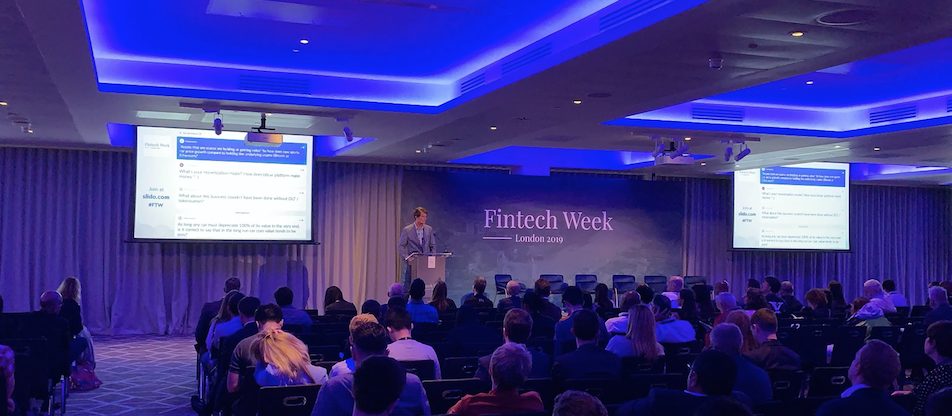Credit: https://thefintechnews.com
London Fintech Week, back for the 6th year in a row, gathered together its usual line-up of industry titans to dive deep into the latest developments in the sector.
Credit Kudos’ Freddy Kelly took to the stage just after lunch on Monday and what he had to say did much to rouse delegates from their gnocchi-induced lethargy. Over a succinct 20 minutes, the credit scoring CEO brought the looming threat of big tech to legacy finance into crisply sharp relief.
Kelly first essayed the offerings GAFA (Google, Amazon, Facebook and Apple) already have before adding that 52% of millennials would happily use such products. This will prove a particularly alarming stat for those under the impression that consumers don’t trust the tax-dodgers of Silicon Valley with their money.
The primary obstacle standing between big tech and “the banks’ lunch” isn’t tech or consumer trust but those pesky bloody regulators!
Pondering the dilemma facing Messrs Bezos, Zuckerberg and Pichai, Kelly mused;
“Can I walk like a bank, talk like a bank…without being a bank?”
On the Road to Adoption – Dream or Reality? panel, Unblocked Events’ Helen Disney picked the brains of some of the web’s most influential millennials on the thorny issue of DLT and cryptocurrency. The most strident voice amongst the #FunkyBunch was Wonder Makerspace’s ChristyAna Taveras who issued a challenge to the conference’s own organisers. The strategy director suggested that next year’s Fintech Week involve local vendors by getting them to accept cryptocurrencies as payment.
 The road to adoption, it seems, begins at home;
The road to adoption, it seems, begins at home;
“Let’s get you to trade digitally.”
Whilst Taveras sees the solution to the problem of blockchain implementation and adoption with blinding clarity, moderator Disney was keen to add a little nuance. Referring to the launch of Facebook’s new Libra coin and the myriad new questions it raises, the industry stalwart deadpanned that, in the parlance of a relationship status, “It’s complicated.”
If the social media influencers think they’re having a hard time, then they should spare a thought for the poor regulators. Their poor little (mostly middle-aged) heads must be spinning!
However, rather than shrinking from the challenges new developments throw up, Polsinelli’s Richard Levin asserted that the SEC and FCA have plenty of lead left in their pencils. Furthermore, they have a greater understanding of technological advances than they’re often given credit for. In Levin’s opinion the greatest barrier between the regulators and the innovators is one of communication;
“Regulators speak Latin whilst technologists speak Greek”
IF THE SOCIAL MEDIA INFLUENCERS THINK THEY’RE HAVING A HARD TIME, THEN THEY SHOULD SPARE A THOUGHT FOR THE POOR REGULATORS.
Day two commenced with fewer delegates and further blockchain deliberations. Before attendees could scamper to the lunchtime buffet, Christopher Burke (CEO EUC Plus), discussed the danger of, brace yourself… using spreadsheets.
A Forbes article recently claimed Microsoft Excel might be the most dangerous software on the planet. Firms such as JP Morgan and Societe Generale have lost billions in compliance fines resulting from poor data management.
Condensing his 45 minute presentation to a breezy 15, Burke urged the room to utilise software to secure spreadsheets. Understanding your data flow helps mitigate risk, which in turn, keeps the regulators happy.
In the afternoon sessions, Barry James (Founding Chair BBFTA) moderated a lively panel on the future of money. Predictably, the conversation tended towards Facebook’s Libra.
Thomas Power (Team Blockchain) described Facebook as an ersatz government and Libra as little more than a ploy for control in a game only the tech giants get to play.
“Buying Bitcoin is all we’re left to do”, voiced a defeated Mr Power.
David Palmer (Blockchain Consultant) spoke of how Libra is just the beginning, opening the door for Amazon and Google to construct their own currency.
 With the tech powerhouses throwing their weight around (and still refusing to pay their taxes!) global regulation is required to improve governance and garner heightened transparency.
With the tech powerhouses throwing their weight around (and still refusing to pay their taxes!) global regulation is required to improve governance and garner heightened transparency.
Flying over the pond from the Bay Area, Christine Loredo (Vice President of Fintech Evangelism), headlined the main stage to ask the audience what it takes for fintech start-ups to succeed. How do you grow into a Monzo and avoid becoming a Loot?
Loredo, with her wealth of experience working in incubators, dished out the magic formula for fintechs to thrive in an increasingly crowded market.
Going back to basics, the first step is being able to solve a meaningful problem. There needs to be a sense of urgency for the customer to buy into your product. Otherwise, you won’t get out of the starting blocks.
WITH THE TECH POWERHOUSES THROWING THEIR WEIGHT AROUND (AND STILL REFUSING TO PAY THEIR TAXES!) GLOBAL REGULATION IS REQUIRED TO IMPROVE GOVERNANCE AND GARNER HEIGHTENED TRANSPARENCY.
The Californian pleaded the importance of building the right team with the required skill sets, and using “leadership to guide your vision”.
In addition, start-ups have to be flexible enough to navigate change. This requires a process of testing and refining to determine what works. Perseverance should never waver and the end goal should always be clear.
In closing, Loredo encouraged fintechs to build early-stage relationships with venture capitalists, whose expertise can aid in both funding rounds and shaping the product.
What about Brexit? I hear you ask. I’m afraid no one has the crystal ball there. And we may even have to wait until the 7th instalment of Fintech Week to find out…

